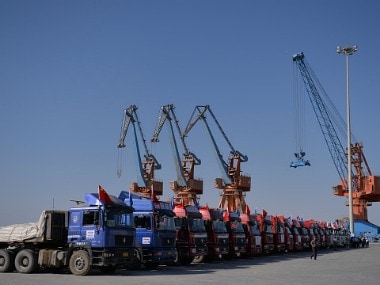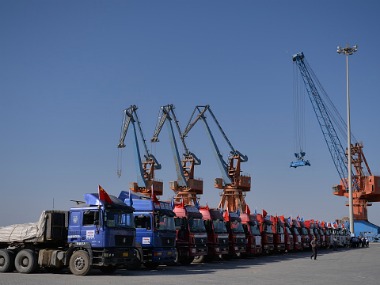A report published in a reputed newspaper about China quietly holding talks with insurgents in Balochistan, hardly comes as a surprise. Quoting the Financial Times, the Pakistani newspaper Dawn reported that Beijing has been in direct contact with militants to protect their investments in the province. [caption id=“attachment_3886433” align=“alignleft” width=“380”]  Representational image. Getty Images[/caption] Chinese plans for Pakistan via the China-Pakistan Economic Corridor ( CPEC) hinge on its ability to freely maneuver in the province, which is the vital exit point for a project that bases itself on connectivity with the outside world. A CPEC which winds its way into a Pakistan without Balochistan is quite simply something of a dead end. Pakistan is not a market or a resource-rich country. It simply lies in the path towards such regions. Simply put, the original declared basis for CPEC, and indeed for the Belt and Road Initiative (BRI) as a whole, is to get Chinese goods and services out of the mainland and into other countries through a string of investments in ports, roads and railways, not to mention the power and other infrastructure needed to sustain each of these. CPEC is a showboat for the project as a whole, and critical to that is the port of Gwadar, which is in Balochistan. While the ports of Sindh are also part of the project, they are firstly far too silted, overcrowded, and far too close to the Indian mainland. Gwadar on the other hand, lies on a naturally deep sea port, close to the strategic Strait of Hormuz, and has hardly any population to speak of in the surrounding areas. A little further up the coast, are Pakistani Navy installations, providing an effective defense for the port. In addition, it would be assumed that a province forming more than 44 percent of Pakistan’s total land area, and yet having the lowest human development indicators in the country, would have put out the bunting for Chinese investors and celebrated their release from grinding poverty. Clearly, this is not the case. One of the world’s longest running insurgencies is in no mood to respond to the wiles of the Chinese, and there are good reasons why. Some while ago, the deputy chief of mission at the Chinese embassy explained in a series of tweets that Chinese investment in Balochistan was far higher than the rest of the country and tabulated the various projects involved. This was in response to accusations from mainstream politicians, that Punjab had, as usual, hogged the largest slice of funds from the Chinese, leaving the others a mere pittance. The data provided by the Chinese embassy seemed to prove that the Chinese had been more than attentive to the Baloch, with some 16 projects ‘located’ in the province. However, a closer look indicates that barring one, all of these are to do with the exploitation of Gwadar port. While this may seem entirely justifiable on the face of it, the reality is that Gwadar as a business plan is not meant to employ Baloch people, other than as labour. Sadly, Balochistan’s education indices are paltry when compared to the rest of Pakistan. Few teachers, and fewer schools means that the Baloch are hardly likely to be employed at managerial-level jobs. Those are likely to go to the Sindhis and the Punjabis, with good education backgrounds, and well able to ‘tie up’ with the bureaucracy for coveted posts. The major managerial jobs will of course, be entirely with the Chinese. At present, some 300 Chinese are working at various levels, and live in their own township with shops, restaurants, and captive power generation. While Gwadar blazes with light, the rest of the town lies in darkness, plagued by power outages. The contradictions are even more apparent in language of ‘development’ in which these projects are couched. Few projects are actually meant to provide anything of the kind for local people. An examination of the data provided by the official CPEC portal indicates that a grand plan for a university will actually translate only in ‘twinning’ an existing university with a Chinese one. Moreover, even this is still a long-term project and yet to receive active consideration. Another plan for setting up downstream industries in Balochistan that could service the port is not even part of the CPEC plan yet. The province is, however, the proud recipient of China’s only major grant for a social sector project: A planned $100 million for a hospital. However, even here a Letter of Effort (LoE) has yet to be signed to allow the project to proceed on expected lines. Water desalination plants have also been promised, but will probably serve the port area, rather than the chronically water deficient towns and villages. In addition, there is nothing yet apparent that is meant to compensate the local population for displacement to make way for the massive enterprise. One example are Gwadar’s fishermen who make up nearly 80 percent of the population, and who have lived here for decades. Indeed, the Mullah Band area is actually seen as the historical origin of the Gwadar area. As of now, it appears that some 100 families have been moved out to new locations, with promises of land, and amenities which never arrived. Several thousand more are expected to be moved to alternate locations further east. This is likely to be strongly resisted, but to little avail, given that the project is backed by the might of the Pakistani State. Insurgents in Balochistan, therefore, are hardly likely to have difficulty in finding recruits. An indicator of this is the spread of the insurgency from the traditional inland and central areas of the province to the coastal Makran area. Also apparent is the shift of insurgent leadership from the traditional sardars of the Marris, Mengals and the Bugti tribes, to the middle class who are likely to be the most affected by not only CPEC, but are also most aware of the realities of non-governance and repression into which their province has fallen. They are also overwhelmingly part of the several thousands of “missing persons” who’s numbers seem to be growing by the day. Even if the account of the International Voice of Baloch Missing Persons were to be disbelieved, there are accounts from others including the state department, the Pakistan Human Rights Commission and reports of the findings of the judicial commission set up to probe the finding of mass graves in Khuzdar. Clearly, there has been a level of repression to an extent that is largely unknown outside Pakistan, or even outside the province. The Baloch are no strangers to repression, nor are they unused to resisting it. Both insurgency and repression are therefore likely to continue into the foreseeable future. That is probably what the Chinese have concluded. Over the past few years, Chinese officials have been known to have set up their own information network for the province, without the knowledge or permission of the local police and the intelligence bureau. This probably initially translated into a ‘protection’ racket, so that insurgents or those supporting them did not attack Chinese nationals in the area. This cautionary tactic may have been set off by the attack on Chinese technicians in May 2004 which killed 3 and injured 9 in Gwadar. Thereafter, there have been attacks on Chinese nearly every year, but nowhere near the violence levels seen by the rest of the province. In December 2017, however, the Chinese embassy warned its nationals of impending attacks, and directed that security be increased. Clearly, the outreach to Baloch rebels has not entirely delivered on its objectives. Large manufacturing and other firms do have a significant outreach into their surrounding areas. Keeping the local population reasonably happy is part of the responsibilities of top management. Keeping a quiet tab on their activities is also usually part of the security detail’s responsibilities, so that trouble is quashed before it can rear up and destabilise the project. However, firstly, this is usually in one’s own country. Second, it is usually directed towards generally peaceful villages and local populations. A country that is willing to talk its way into a foreign area rife with insurgency is not simply asking for trouble, it is also in some ways making a dangerous ingress into the other country’s sovereignty. It may be argued that Pakistan being already well under the Chinese heel, a little more hardly matters. But Islamabad must remember that Beijing’s outreach is not meant to benefit the Pakistanis. It is aimed at protecting and benefitting itself. Sometimes, these two objectives may be mutually contradictory. That’s when Pakistan may find itself in dangerous waters.
A report published in a reputed newspaper about China quietly holding talks with insurgents in Balochistan, hardly comes as a surprise.
Advertisement
End of Article


)

)
)
)
)
)
)
)
)



